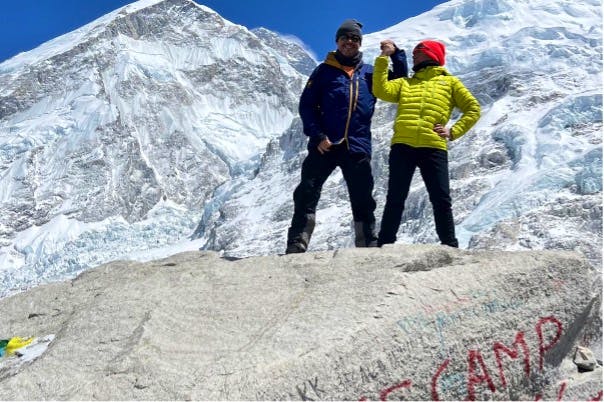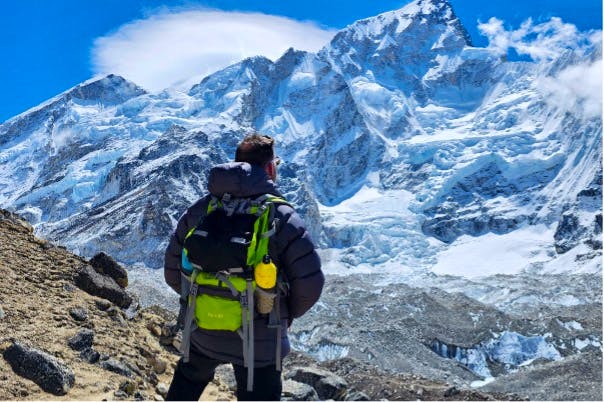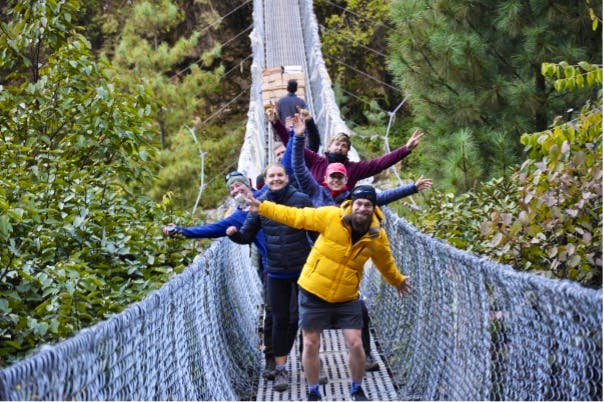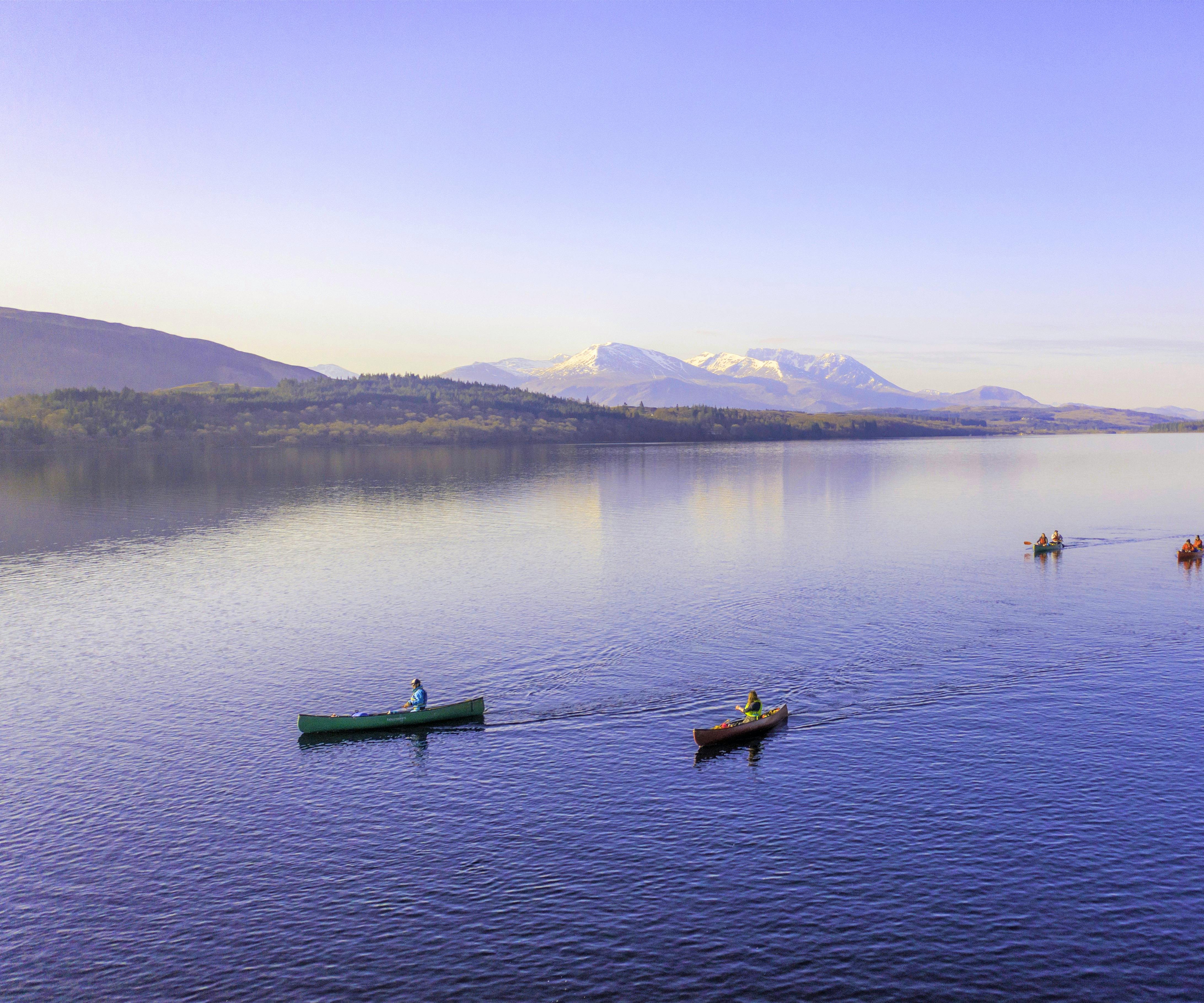Can You Trek To Everest Base Camp On Your Own?
Ever wondered, “Can you trek to Everest Base Camp on your own?”
At Skyhook, we often get asked this burning question when travellers want to brave the hike to EBC. Let’s find the answer!
Can You Do Everest Base Camp On Your Own?
You used to be able to hike to EBC solo, but new regulations were introduced in April 2023 that mean you now need to take a registered guide.
Why You Can’t Go It Alone: The Legalities
If you’re dreaming of a solo trek to Everest Base Camp, it’s time to recalibrate those plans.
According to Nepal government regulations, independent trekking to Everest Base Camp is prohibited.
You must hire a registered guide for your journey. This rule isn’t just a bureaucratic hoop to jump through; like EBC insurance, it’s a safety measure designed to protect trekkers and preserve the natural environment.
Ignoring this requirement can result in severe penalties, including fines and deportation. Moreover, without a guide, you won’t be able to obtain the necessary trekking permits, which are checked when you enter Sagarmatha National Park.
So, not only is trekking without a guide illegal, but it’s also a fast track to many complications that could derail your adventure before it even begins.

The Unsung Heroes: Why Guides and Sherpas Are Essential
Guides and Sherpas are more than just route-finders; they’re your lifeline. These experts are trained to handle the unpredictable conditions of high-altitude trekking, from sudden changes in weather at EBC to the symptoms of altitude sickness.
They know the route to Everest Base Camp like the back of their hand and can lead you through shortcuts and less-travelled paths that you’d never find on your own.
But their role goes beyond mere logistics. Sherpas, often from local communities, enrich your journey with insights into the culture and traditions of the region.
They’ll introduce you to local customs, help you interact with villagers, and even teach you a few phrases in the local language. It’s like having a cultural ambassador, survival expert, and friend all rolled into one.
The Altitude Factor: Why Expert Guidance is Crucial
Altitude sickness is a natural and present danger when trekking to Everest Base Camp.
Symptoms can range from mild headaches and nausea to severe conditions like High Altitude Pulmonary Edema (HAPE) and High Altitude Cerebral Edema (HACE), both of which can be fatal if not treated promptly.
This is where expert guides come into play. They’re trained to recognise the early signs of altitude sickness and take immediate action, which often involves descending to a lower altitude.
Take the story of a trekker named Sarah, who started experiencing severe headaches and dizziness on her way to the Base Camp.
Her guide quickly recognised the symptoms of altitude sickness and made the call to descend to a lower elevation, likely preventing a life-threatening situation.
But prevention is better than cure. Guides also help you acclimatise properly to minimise the risks. They plan “rest days” during the trek, where you ascend to a higher altitude for a short period and then descend back, helping your body get used to the reduced oxygen level at Everest Base Camp.
These acclimatisation days are strategically placed at key points along the route, like Namche Bazaar, to ensure you’re as prepared as possible for the challenges ahead.


Latest Deals
The Local Touch: How Guides Elevate Your Experience
When trekking through the Himalayas, the landscape isn’t just a backdrop; it’s a living, breathing ecosystem rich in flora, fauna, and cultural history. This is where a local guide’s expertise truly shines.
They can point out indigenous wildlife, from the elusive snow leopard to the vibrant Danphe bird, Nepal’s national bird. They can also identify various plant species, some of which have medicinal properties used by local communities.
But it’s not just about nature; it’s about culture, too. Guides often share intimate stories and legends tied to various landmarks you’ll pass, adding a layer of depth to your journey.
Have you ever wondered about the chortens (stone Buddhist monuments) you see along the way? Your guide can explain their significance and the proper way to pass them according to local customs.
And let’s not forget the culinary delights! A guide can introduce you to authentic Nepali cuisine, from steaming momos to hearty dal bhat, and maybe even share a traditional song or dance at the end of a gruelling day. These small touches transform a trek into a rich, immersive experience.
The Community Spirit: Trekking as a Group Experience
Trekking to Everest Base Camp is also a social adventure.
When you trek in a group led by a guide, you’re gaining the benefit of expert navigation and safety measures and becoming part of a mini-community. This community spirit often becomes one of the most cherished aspects of the trek.
See Skyhook's group treks like this 12-day EBC hike or this 15-day guided trip to EBC.
Firstly, there’s safety in numbers. Whether crossing a tricky section of the trail or getting through a particularly tough day, having a group around you provides practical and emotional support.
If someone in the group faces any difficulty, be it physical or emotional, the collective experience and wisdom of the group, led by the guide, can be a powerful asset.
Secondly, the shared experiences create a bond that’s hard to replicate. Whether it’s the collective awe of watching the sunrise over the Himalayas or the group cheers when you finally reach Base Camp, these moments become more special when shared.
Not to mention, the evenings spent in a teahouse, sharing stories and experiences, add a whole new layer to the adventure.
Lastly, trekking in a group can also be a melting pot of cultures. It’s not uncommon to find trekkers from different parts of the world in a single group. The diversity adds a unique flavour to the experience, making it richer and more enlightening.

Conclusion
Hiking to Everest base camp is a life-changing experience best undertaken with expert guidance.
While going solo may seem tempting, the legal requirements and the invaluable support from guides make a strong case for a group trek.
From navigating the risks of high altitude to enriching your journey with local insights, a guided trek is not just a requirement but a wise choice. So, pack your bags, gather your tribe, and set out on the adventure of a lifetime.
More EBC Articles
Popular EBC Trips
Find your next adventure
Why Skyhook?
Join over 27,000 Skyhook adventurers who've used our platform to book directly with our vetted local guides, at local prices (we never markup).
Expert Local Guides
Experienced local guides, handpicked by us.
Best Prices
Never pay a markup on the local guide's price.
Exclusive Club
Earn loyalty rewards every time you travel.
Great Social Vibes
Small group tours provide a richer experience.
Stellar Feedback
Over 2,800 reviews, average of 4.9/5 stars.












